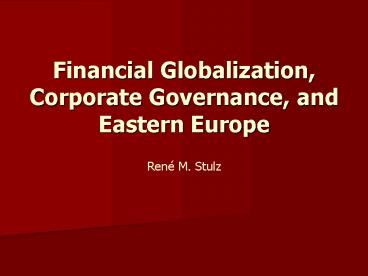Financial Globalization, Corporate Governance, and Eastern Europe PowerPoint PPT Presentation
1 / 32
Title: Financial Globalization, Corporate Governance, and Eastern Europe
1
Financial Globalization, Corporate Governance,
and Eastern Europe
- René M. Stulz
2
Is the financial world flat?
- Since end of World War II, dramatic reduction in
barriers to international investment. - Neo-classical model predicts a flat world for
finance Extensive risk-sharing across countries
and reduction in the role of countries. - Lucas (1990) argues that since marginal
productivity of capital is higher in emerging
markets, capital should flow to emerging markets
form developed markets. - What do we see? A world that is not flat.
3
Neo-classical world upside down?
4
Why is the financial world not flat?
- With weak governance, the return from investing
does not accrue fully to the providers of capital
because of what I call the twin agency problems. - Agency problem at the firm level Corporate
insiders consume private benefits. - Agency problem at the state level State rulers
consume private benefits.
5
Implications of twin agency problems
- With the twin agency problems, the financial
world is not flat. - The twin agency problems lead to ownership
concentration. - Therefore, countries where the twin agency
problems are important cannot take full advantage
of financial globalization.
6
Roadmap
- The twin agency problems.
- Implications for financial globalization.
- Eastern Europe.
- Conclusion.
7
The Model
Date 0
Private benefits
State expropriation
Entrepreneur starts firm
Sells equity to public
Liquidating dividend
Entrepreneur does not start firm
Becomes portfolio investor
8
The First Twin Agency Problems with Corporate
Insiders
- Corporate insiders consume private benefits
- Planes, easy life, outright theft
- Deadweight cost of private benefits is higher in
countries with better investor protection - Ex post incentives to extract private benefits
fall as the insiders stake in the firm grows - More co-investment is optimal when investor
protection is weaker
9
The Second Twin Agency Problems with State
Rulers
- Extract private benefits also
- Redistributive taxes, confiscate assets, require
bribes - Managerial entrenchment limits expropriation by
state rulers - Firms with professional managers and atomistic
shareholders are inefficient when problem is
serious
10
Twin Agency Problems
- Problems interact with one another
- Empirically, low expropriation risk is a
necessary condition for diffuse ownership - Family control of firms is prevalent in all
countries with moderate or high risk of state
expropriation
11
The value of cash
12
Ownership concentration and financial
globalization
- Financial globalization reduces the cost of
capital. - With ownership concentration, a firm can take
advantage of a reduction in the cost of capital
only to the extent that insiders can co-invest. - Hence, the impact of financial globalization is
lower when ownership is concentrated.
13
The neo-classical world
14
The world with the twin agency problems
15
Macroeconomic implications
- Home bias.
- Savings-investment correlation.
- Consumption correlation across countries.
- Financial market development.
- Economic growth.
16
Eastern Europe
- How good is governance?
- Use World Bank indicators and compare to similar
income countries as well as to Western countries.
17
Governance indicator Overall
18
Governance indicator Rule of law
19
Governance indicator Corruption
20
Implication
- From the theory, we expect concentrated
ownership. - Source of data is Worldscope.
- Alternative approaches also show that ownership
is concentrated in Eastern Europe.
21
Ownership concentration in Eastern Europe
22
Ownership concentration through time
23
What about alternative ways to control agency
problems?
- Doidge, Karolyi and Stulz show that country
characteristics explain most of the firm-level
variation in governance. - Use CSLA rating for firm-level governance in
Eastern Europe. Other firm-level governance
ratings generally used do not rate firms in
Eastern Europe.
24
CSLA ratings
25
Firm valuations
- Expect low firm valuations.
- Data on Tobins q from Doidge, Karolyi, and
Stulz. - Data from Worldscope.
26
Tobins Q in 2004
27
Financial development
- The analysis implies that the problems documented
so far are accompanied by low financial
development. - Data from IMF.
28
Financial Development in Eastern Europe
29
Foreign investor participation
- Expect low foreign investor participation.
- Data from U.S. Treasury International Capital
System (TIC) for U.S. investors.
30
U.S. portfolio holdings in Eastern Europe
31
Problems with governance reform
- Insiders have paid for their private benefits, so
reform that restricts consumption of private
benefits takes money away from them. - Hence, governance reform must be designed so that
it benefits insiders as well for it to happen. - Insiders can gain because they can sell their
stake and benefit from diversification. - Importance of financial openness as a solution.
32
Conclusion
- The financial world is not flat because of the
twin agency problems. - Poor governance leads to ownership concentration
which prevents countries from taking advantage of
financial globalization. - Evidence for Eastern Europe consistent with the
theory Poor governance, high ownership
concentration, low firm valuation, low financial
development, and low participation by foreign
investors. - Improvements in governance would make it possible
for Eastern Europe to benefit more from financial
globalization, but such improvements have to be
made in a way that benefits incumbents as well
for them to be successful.

